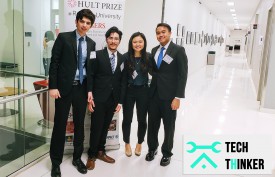This March, a group of four Honors College first-year students will attend the Hult Prize Regionals in San Francisco. While living as hallmates, Kevin Estabillo (‘22, SOE/HC), Sebastian Muñoz (‘22, SAS/HC), Ty Goldin (‘22, SAS/HC), and Claire Whang (‘22, SAS/HC) learned about the Rutgers Hult Prize Competition and decided to form their own social innovation business and compete. After placing second at Rutgers, they decided to apply directly to the Hult Prize Regionals and were accepted to the next competition round in San Francisco.
The Hult Prize, often referred to as the “Nobel Prize for college students,” is focused on social innovation. Its 10th anniversary challenge is to develop a business that establishes the framework to offer purposeful work to 10,000 youth within the next decade, to solve the problem of burgeoning youth unemployment rates. The Honors College team created Tech Thinker, which is based on the idea of teaching youth workers in the Philippines how to recycle and repair phones and other electronic devices, thus providing them with a skill set applicable to future jobs in technology.
“In addition to advancing employment in technology, the business incorporates e-waste and broken electronics management, which involves tackling two different problems that are prevalent in the Philippines and elsewhere in the world,”
says Claire.
By using parts found in e-waste to fix the broken electronics, Tech Thinker’s model can help develop a self-sustaining cycle with environmental and economic benefits for the Philippines.
The Tech Thinker team started as friends, but their experiences as team members only brought them closer. Claire described the project as “a good bonding experience” and reflected that everyone “contributed something different.” “It was also interesting and exciting to see how we all work under pressure, having just a few days to prepare everything [for the Rutgers competition],” Sebastian said.
The team identifies diversity in gender, ethnicity, and field of study as important factors in cultivating an interdisciplinary team with different perspectives to contribute and refine their business, which was emphasized in their meeting with Mukesh Patel, Honors College Director of Innovation. As far as advice for current or prospective students, Claire thinks that more people should participate in the competition:
“There are plenty of people who could have had good project ideas that would go far if they had only known about the opportunity to compete for the Hult Prize starting at Rutgers.” “Start early, as early as you can,”
Sebastian recommended.
As the Hult Prize Regionals approach, the team is excited to experience San Francisco. Kevin looks forward to the challenge that accompanies competition, as he has “never done anything at this level and hopes to get more confidence in public speaking.” Ty likes to see “how well you can do and how far you can push yourself” and finds the fun in interactions with judges and other competitors. Overall, the team is enthusiastic to see where this experience takes them and, of course, to be in California for their spring break.
Over the past three years, Rutgers students have brought leading social innovations to the Hult Prize. In 2017, now Rutgers graduates Gia Farooqi, Hasan Usmani, Moneeb Mian, and Hanaa Lakhani won the global competition for the $1 million Hult Prize with their transportation business, Roshni Rides, and had the chance to meet President Bill Clinton. Last year, Rutgers sent two teams, one—called Sulis—included three Honors College sophomores, Yuki Osumi ('20, SAS), Sarah Pomeranz ('20, RBS), and Anurag Modak ('20, SAS), with Ari Mendelow (‘18, SOE). Sulis created and presented a solar-powered water purification device. At the culmination of the Hult Prize summer accelerator program in London, the team placed seventh in the world, narrowly missing out on the final round of competition, above more than approximately 80,000 teams from around the world.
The Honors College mission—Curiosity. Knowledge. Purpose.—focuses on social innovation while teaching students how to move their ideas forward. From their first year at the Honors College, students are challenged to think beyond their own roles in society through the Forum, the mission course designed to foster interdisciplinary teamwork and project-based collaboration. Students, like Tech Thinker’s founders, can then apply to the HC Innovation Lab, a three-credit course for sophomores led by Mr. Patel, to develop their ideas further through mentorship, professional opportunities, and research access.
The Tech Thinker team hopes to continue to work and develop their business into something beneficial and adaptable to the future and says that the Honors College Innovation Lab is a possibility. For now, as Kevin recognizes, “there is a lot of pressure, but if [Roshni Rides and Sulis] were able to do it with the resources here, then I think we also have a good shot at doing well at Regionals.”
